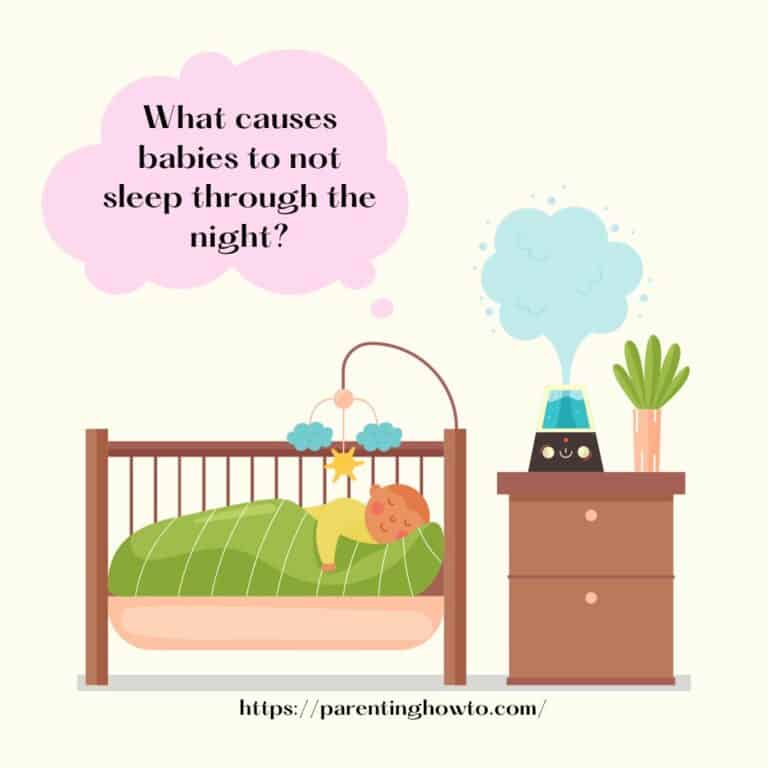Are you worried about your toddler who’s been under the weather lately? Are you feeling concerned when they want to sleep all day? Don’t worry, we’ve got some advice on what to do in this situation! In this blog post, we’ll discuss whether it’s ok to let a sick toddler sleep all day and how to make sure they get the rest they need.
Understand the Symptoms of Your Toddler’s Illness

When your toddler is ill, it’s important to understand the symptoms they are displaying in order to provide proper care. While some illnesses can be life-threatening and easy to recognize, others may display more subtle signs that require closer observation.
Common symptoms of illness in toddlers include excessive sleepiness, refusing food and liquids, light yellow urine, and waking more frequently at night. If your child is exhibiting these symptoms or any other unusual behavior, it’s important to take them to the doctor for an accurate diagnosis.
It’s also important to make sure your child gets enough rest while they are sick. Sleep helps their body heal and fight off the illness. Encourage them to sleep as much as possible and make sure you provide plenty of fluids throughout the day so they don’t become dehydrated.
Caring for a sick toddler can be tiring and stressful so don’t hesitate to ask for help from family or friends if you need it. With rest and proper hydration, most illnesses can be treated quickly and easily with no long-term effects on your child’s health.
Check for Fever
Fever is a common symptom of many illnesses, and it’s important to keep an eye on your child’s temperature. For babies and toddlers three months old and up, it’s OK to let them sleep if they have a fever, but you should still monitor their temperature.
You can use a digital thermometer to check your child’s temperature. If the thermometer is placed in the armpit, it may not be as accurate, but can still provide good information. For older kids who can understand taking their own temperature, you can place the thermometer under the tongue for more reliable results.
Generally speaking, for babies or toddlers over three months old it is safe to allow sleep, even with a fever. However, if your child has a fever of 100.4°F or higher that lasts more than 24 hours in babies 3-12 months old or any fever lasting longer than 48 hours in children aged 1-3 years old then you should call your doctor right away.
To help make your child comfortable while they are sleeping with a fever: put cool compresses on their head; keep the room at a moderate temperature; give them plenty of fluids; and don’t wake them up to give medicine unless instructed by your doctor. Adequate restful sleep is essential for recovery from an illness so let them get as much rest as possible!
Know When to Call the Doctor

If your child is sick, it can be hard to decide when to call the doctor. It’s important to know when your child needs medical attention and when you should wait until normal office hours. Here are some tips to help you decide when it’s time to call the doctor for your ill child.
If your child has any of these symptoms, call your pediatrician immediately: a high fever, difficulty breathing, chest pain or tightness, severe stomach pain or vomiting/diarrhea for more than 24 hours, confusion/disorientation, a rash that does not go away after applying calamine lotion or other over-the-counter treatments.
If you suspect that your child may have been exposed to a contagious illness such as chickenpox or the flu, contact your doctor right away. You should also contact them if you notice any signs of dehydration in your ill toddler such as sunken eyes and dry mouth.
It may be difficult to determine whether or not you need medical attention during cold and flu season. If there is any doubt in your mind about what course of action you should take with an ill toddler/child, call the pediatrician’s office first thing in the morning and explain the situation. The person who answers may not be able to diagnose over the phone but they can speak with the on-call doctor if necessary.
If it’s past regular office hours and you think that immediate medical treatment is needed for an ill toddler/child (such as severe breathing difficulties), call 999 (NHS 2017b). You can also take them straight to A&E at their local hospital for assessment and treatment if necessary.
No one
Should You Let a Sick Toddler Sleep All Day?

When your sick toddler needs extra sleep, it’s important to let them rest and recuperate. Sleep is a key part of the healing process and allowing your little one to have additional rest time can help them recover faster.
However, it’s also important to make sure that they are still hydrated, eating enough calories and getting some awake time. It’s best to trust your gut when deciding how much sleep is necessary for your little one.
It’s not recommended to allow a sick infant or toddler to sleep on the couch with you as this increases their risk of sudden infant death syndrome (SIDS). Instead, try sleeping in their room or setting up a safe sleeping area nearby so that you can easily monitor them.
There really isn’t such thing as “too much” sleep for a sick child unless they become unresponsive or too lethargic. If this happens, seek medical attention right away and be sure to follow any instructions from their doctor regarding care while they are ill.
Finally, remember that while extra sleep may be beneficial during times of sickness, it is also important for toddlers to receive proper nutrition and hydration in order to promote healing and prevent further illness. When in doubt, consult with your pediatrician about how best to care for your little one while they are feeling under the weather.
How Much Sleep Does a Sick Toddler Need?
Sick toddlers need more rest than usual to aid in recovery. The amount of extra sleep required varies from 30 minutes to an extra 3-4 hours. Generally, a toddler should get between 12 and 15 hours of sleep each day, including naps.
If your toddler is ill, it’s important to provide them with plenty of TLC and water during this difficult time. You may also need to establish healthy sleep habits that can help your child rest better at night.
Make sure to read stories or play soothing music for them if they’re having difficulty falling asleep. If your little one has been sleeping for longer than 2-3 hours during their nap, try gently waking them up after the allotted time.
This will help ensure they don’t become overtired and are able to enjoy their awake time too!
Make Sure to Keep Your Child Hydrated

Making sure your child stays hydrated is essential when they are feeling under the weather. When kids are sick, they can quickly become dehydrated as a result of fever, diarrhea, vomiting, or sweating.
Parents should ensure that their child drinks plenty of fluids to prevent dehydration and keep them comfortable.
Babies under 6 months old should drink breast milk or formula in order to stay hydrated. Toddlers and older children may benefit from drinking Pedialyte, diluted juices, clear broths or soups, electrolyte drinks, sports drinks, or popsicles made with fruit juice to replace lost fluids and electrolytes.
Avoid giving your child caffeinated drinks such as soda or coffee as these can cause further dehydration.
It is important to monitor how much fluid your child is taking in and how often they are urinating throughout the day.
If you notice that your child isn’t drinking enough fluids or is having difficulty keeping liquids down due to vomiting or diarrhea, call your doctor for advice on how to maintain proper hydration levels for their age group.
It’s also important that if your baby has a fever above 102 degrees F (39 degrees C), you should seek medical attention right away as this could be indicative of a more serious medical issue than just dehydration alone.
Monitor Their Eating Habits and Appetite

When a toddler is sick, it’s important to monitor their eating habits and appetite. While they may sleep more than normal, it’s important to make sure they are getting enough hydration and nutrients.
To ensure this, focus on providing nutritious meals and snacks that appeal to them, as well as giving plenty of fluids in between meals.
If appetite is low or your child is too tired to eat, try offering smaller portions throughout the day rather than large meals.
Also consider preparing foods that require minimal effort for them to eat such as yogurt, crackers and soup. If your child has a fever over 100 degrees Fahrenheit or shows signs of extreme fatigue, contact your healthcare provider for advice on what steps to take next.
Offer Comforting Foods that are Easy to Digest

When a toddler is sick, it can be difficult to identify what types of food they need to get the nourishment and hydration they require.
Offer them comforting foods which are easy to digest, like the BRAT diet (Bananas, Rice, Applesauce and Toast). Bland foods like chicken soup or broth, crackers or white bread, applesauce and small pieces of ripe cantaloupe or watermelon are great options as well.
You can also make your own homemade soups with additional ingredients such as crumbled-up whole wheat crackers or cooked vegetables for added nutrition. Stewed apples are also an excellent choice as they help replenish fluids lost due to coughing or sneezing.
To ensure that your toddler gets the energy needed for recovery, feed them small meals frequently throughout the day. Avoid greasy and fried foods as these can be harder for their stomachs to digest properly. With the right nourishing food choices you will help your child feel better in no time!
Maintain a Healthy Temperature in the Bedroom
Maintaining a healthy temperature in the bedroom is essential for your child’s well-being. An ideal temperature for toddlers to sleep in is 18°C to 22°C (65°F to 72°F). Keeping their sleeping quarters at this temperature will help them get a good night’s rest and also prevent any sickness from occurring.
When your child has a fever, it can be difficult to maintain a healthy temperature in their bedroom. To help keep them comfortable, you can use lightweight blankets or sheets and dress them in breathable clothing such as cotton pajamas. A cool, damp cloth placed on their forehead and neck can also provide relief from discomfort caused by fever. Additionally, make sure your little one has plenty of fluids throughout the day and evening.
Naps are especially important when your baby is sick; they need more rest when fighting off infection or recovering from illness. Allow them longer naps than usual so that they can get the quality sleep they need to recover quickly. Also remember that babies regulate their body temperature predominantly through the face and head – so make sure they are sleeping on their back with their face uncovered for optimal comfort while resting.
Finally, if you find yourself getting overwhelmed by helping your sick toddler through the night, try enlisting family members or friends for assistance so that you can get some much needed rest as well!
Talk to Your Pediatrician if You’re Concerned
If you’re concerned about your child’s health, it’s important to talk to your pediatrician. Your doctor is the best person to provide advice and guidance on what steps to take in order to make sure that your child is getting the care they need.
It’s important to keep close watch of your child, especially when they are sick. By monitoring their temperature, breathing rate and other signs of illness, you can get a better idea of how serious their condition may be. If you’re worried about any changes in behavior or if your child isn’t responding as they normally would, it’s always best to call the doctor right away.
Your pediatrician will be able to assess the situation and determine whether an emergency visit or follow-up appointment is needed. In cases of severe illness, such as a fever over 102 degrees Fahrenheit (38.9 degrees Celsius) for more than three days or difficulty breathing, immediate medical attention should be sought.
In addition to assessing the condition of your child, your pediatrician will also be able offer advice on how best treat them at home. This could include things like providing rest, fluids and over-the-counter medications for relief from pain or fever. It might also involve making lifestyle changes like reducing stress levels or reducing exposure to environmental irritants such as smoke or pollen that could worsen symptoms.
Your doctor may also recommend seeing a specialist if they think additional testing is needed in order to properly diagnose and treat a condition. They may refer you to an allergist for further tests if allergies are suspected, for example; or send you directly see an ear nose throat specialist if there appears to be an issue with the ears nose or throat area causing discomfort..
Don’t Overreact If Symptoms Persist or Worsen

It is important to not overreact if symptoms persist or worsen when your child is sick. Always consult your doctor if you have any concerns, as they will be able to provide you with the best advice for your little one. If your baby or toddler has a fever of 100.4°F (38°C) or higher, call their doctor right away.
If symptoms such as coughing, fever, vomiting, diarrhea, and/or sore throat persist after a day or two of home care and rest then it’s important to contact your child’s doctor. In some cases the illness may require antibiotics or further medical treatment.
Never fall asleep with a sick baby on the sofa with you, even if you’re both exhausted. This increases the chances of sudden infant death syndrome (SIDS). For babies or toddlers over 3 months old, it is safe to allow them to sleep during their illness but always check on them regularly and make sure that they are comfortable and breathing evenly.
Sometimes the best parenting decision when your child is ill might conflict with optimal sleep habits – that’s ok too! It’s likely that your baby will sleep more than normal when they are sick so allowing some extra nap time can be beneficial in helping them recover faster.
Just make sure that their bedtime routine remains consistent and don’t let them stay up too late as this could disrupt their normal rhythms and make it harder for them to get back into regular sleeping patterns once they have recovered from their illness.
Conclusion
When it comes to sleeping, toddlers need 11-14 hours of sleep per day, with one long overnight sleep and one to two naps during the day. It’s important to create a consistent sleep routine and stick to it even when your toddler is sick.
Not only will this help them get enough rest, but it also helps their bodies heal faster. Make sure you get enough rest as well by taking breaks and getting someone else to take over occasionally.
If you are concerned about your child’s health, consult a doctor for medical help.



